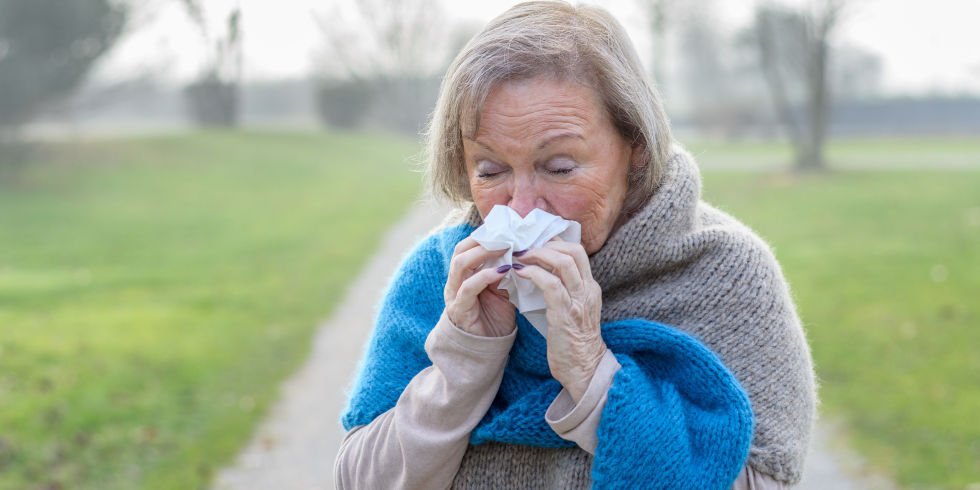

Runny nose, scratchy throat or a tickly cough? It’s horrible knowing that a cold is already in your system – and that it’s only going to get worse.
We’ve all heard that wrapping up warm and drinking plenty of fluids will help you recover once a bug has struck, but are there any tips and tricks that can stop a cold in its tracks? Here, experts tell us what they do to get rid of a cold quickly…
Contents
1. Avoid junk food
As the saying goes, you need to feed a cold – but it’s essential you choose the right foods. Although it’s undoubtedly tempting to reach for something comforting, junk foods like pizza or chocolate, will just lower your immune system and make you feel worse. Dr Adam Simon from Push Doctor says:
“High-fat diets have been shown to slow down your immune system’s response to infection, which will make it harder to fight off colds.”
Instead, drink plenty of water and aim for foods that are healthy and nutritious. Dr Simon adds:
“You need the nutrients provided by a balanced diet to help your recovery, so, hot soups, fresh fruit and lots of vitamin-rich vegetables.”
2. Get some rest
It may sound dull, but try to get an early night. Tv doctor and Superdrugambassador Dr Pixie McKenna says:
“We all underestimate the power of sleep. It affects how we function on a day-to-day basis, our appearance and most notably our immune system. If you feel a cold coming, on make sure you’re in bed early – getting at least eight hours of sleep a night.”
3. De-stress
Your stress levels will also impact your recovery time. Dr McKenna adds:
“Stress lowers your immune system. Reduce your stress levels by working from home, taking a day off to recover or prioritising the more important things while leaving more stressful jobs for when you’re feeling better.”
4. Ditch the cigarettes
While you should aim to quit smoking for your general health anyway, lighting up when you’re fighting an infection is a particularly bad idea according to Justin Jones, professional head of physiology at Nuffield Health.
“Smoking increases the production of a number of stress hormones that suppress immune function. It also increases the body’s exposure to harmful “free radicals” that counter our antioxidant defences.”
So, ease off the cigarettes to feel better faster, and check out the NHS’ top tips on quitting smoking for good.
5. Take vitamin C
Many of us reach for a glass of orange juice once we feel a cold coming on, but will vitamin C really help? Well, a 2013 study of 11,000 adults by the University of Helsinki showed that taking 200mg of vitamin C did reduce the duration of a cold once it had started – by an average of 8%.
Studies have also shown that vitamin C works as an antihistamine and is anti-inflammatory, so can help with a runny noses, and aches and pains.
Remember that vitamin C is found in fresh fruit and vegetables, including kiwis, broccoli and tomatoes, and there are also loads of supplements you can try, such as Vitabiotics Ultra Vitamin C (RRP £5.95). Buy it now.
6. Up your zinc intake
The mineral zinc is also proved to reduce the duration of a cold, too. Research by the University of Ontario in Canada, published in 2012, showed that people who took zinc tablets at the start of a cold shortened its duration.
The reason? It interferes with the replication of rhinoviruses, which cause a cold.
Zinc tablets can be bought in most pharmacies, while the mineral can also be found in foods such as beef, poultry, fortified cereals, yoghurt and milk.
7. Eat garlic
Forget about your breath, if you’ve got a cold then you need to up your garlic intake, according to nutritionist Gabriela Peacock.
“Garlic contains the active ingredient allicin, which is great for fighting infections and bacteria. Try frying it with vegetables, grating it into a casserole or adding it to prawns or chicken.”
Raw garlic is even more effective, according to Dr Simon. But, don’t worry, you won’t have to chomp on an uncooked bulb – try Nature’s Aid Odourless Garlic Pearls, RRP £3.99.
8. Avoid workouts
Help speed up your recovery by avoiding exercise altogether or taking it slower than normal. Dr Petra Simic from Bupa UK says:
“It’s important to listen to your body – if you’re not feeling up to working out, rest instead. A cold can compromise your energy levels but if you do feel well enough, I’d recommend reducing the intensity and length of your workout. Instead of going for a run, try walking, and avoid any intense exercise – such as high intensity interval training (HIIT) because your strength will be affected.”
9. Try a spray
Finally, if you want to stop a cold in its tracks before your symptoms worsen, then it might be worth investing in a defensive nasal spray, such as Vicks First Defence, £7.24.
“A first defence spray is like Teflon for your nose,” explains Karen Shaw, pharmacy officer at Push Doctor. “While there’s no medicine in it, it provides a physical barrier that can prevent the virus from spreading further.”
[“source=netdoctor”]






